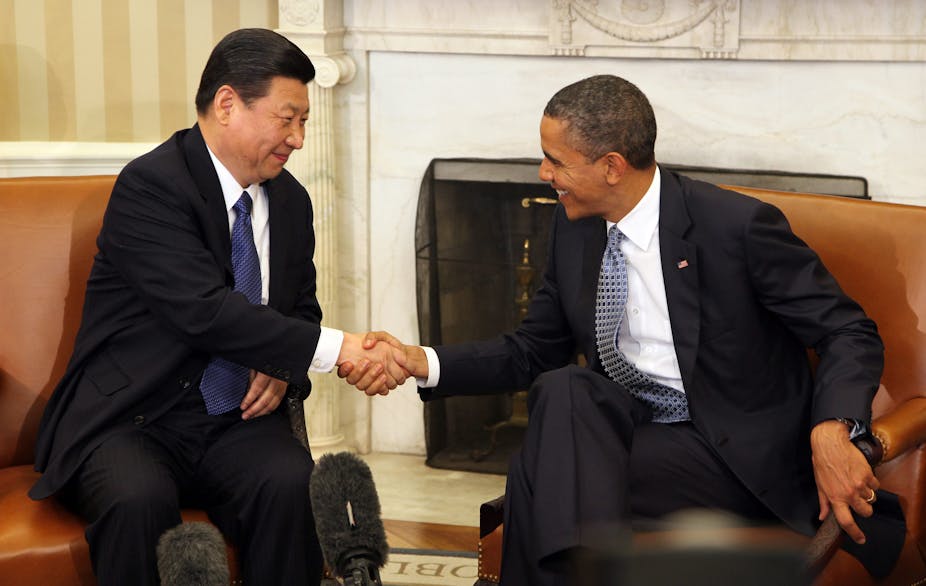CHINA IN TRANSITION: As China goes through its secretive but widely anticipated leadership transition, the rest of the world is watching. This week, The Conversation takes an in depth look at the National Congress of the Communist Party of China.
The obsession with changing world orders and premature assumptions that the world is in flux is endemic to the human character. In this sense, we have never stopped being millenarian, hoping that somewhere along the line, the true order of things will stand before us, crystal clear and optimistic.
Two significant events have and are taking place: the concluded US presidential elections, and the 18th Communist Party Congress in China. Several other states in the Northeast Asian region, notably South Korea and Japan, will also see transitions in their leaderships over the next six months. The urge is then to speculate if these might actually change the contours of power, if at all.
In 1991, US President George H.W. Bush spoke of a “New World Order”, buttressed by the nonsensical claims of Francis Fukuyama that history had ended with the triumph of liberal capitalism. With the end of the Cold War, the tedium of peace would set in, until the butcheries of Rwanda and the former Yugoslavia muddied the idyll.
In 2000, it was again assumed that a world of peace would descend upon the earth, only for this vision to be marred a year later by acts of spectacular violence when planes flew into the World Trade Centre and the Pentagon. The language of fundamentalism and weapons proliferation replaced the language of hope, creating a new collection of concerned powers keen on preventing others from acquiring nuclear, chemical and biological weapons.
The leadership transitions that are now taking place do not change the current global order, tempting as it may be to think so. Our age is characterised by fears of “failed states”, transnational networks of terrorism, porous borders that are being penetrated by those seeking asylum from vast belts of poverty and institutional failure, and the emerging powers, notably the BRICS (Brazil, Russia, India, China and South Africa).
According to Joseph S. Nye Jr., we are witnessing a “power transition” in the rise of a region that is in actual fact its recovery. China’s current leadership transition is evidence of this. It should be remembered that in 1750, “Asia”, that broadly defined expanse of product and populace, had half the world’s population and produced half the world’s product.
Now there is a conspicuous emphasis on the shift of power from West to East. This has caused concern in terms of how existing powers will react. As James F. Hoge, Jr., claimed, the awareness of that power shift “has not yet been translated into preparedness. And therein lies the danger: that Western countries will repeat their past mistakes”.
Where powers decline and others rise, conflict is often irresistible unless managed. US scholar Charles Doran suggests that integrating China into the global system in a peaceful manner is the greatest challenge of the 21st century.
The strategic language from the United States to the emergence of various other powers has proven to be a motley mix – on the one hand welcoming the prospects of greater trade with such a power as China, but remaining concerned that its modernisation and muscle in various theatres will challenge Washington’s primacy. (Beware, for instance, the Taiwan Strait). This has led to the use of what Secretary of State Hillary Clinton has termed “smart power”, code for another way of making sure that the 21st century is as American as the 20th. The language being used, as is so often the case in international relations theory, has simply been brought out of cold storage for immediate adaptation.

A most conspicuous example of this is the “pivot” to the Asia Pacific, involving an increased presence of US ships in the Pacific and relocation of forces to bases in Australia. Few familiar with its historical currency will forget that the term “the geographical pivot of history” came from Halford John Mackinder’s 1904 address to the Royal Geographical Society. There, the imaginative geographer spoke of the “World-Island” comprising Europe, Asia and Africa, islands such as Japan and the British Isles, and further outlying islands (the Americas and Australasia). The pivotal centre of global politics, argued Mackinder, lay in the heartland of the World-Island – the land mass comprising Eurasia, much of it dominated by Russia.
There is now a flurry of speculation that the chess pieces are being moved in the Asia-Pacific region, as seen in the enthusiastic and somewhat vacuous white paper released by the Gillard government on Australia’s role in Asia.
American power is diminishing but will remain superlative. But what we need now are not nostrums about a century that has yet to come, rather a regime of cooperation that will cope with such matters as climate disruption, non-proliferation and militant fundamentalism. Such objectives will include following through with Barack Obama’s Prague Agenda for a world without nuclear weapons, establishing ground rules on global market engagement, and dealing with international financial behaviour.
But as with so much, these challenges will simply be an echo of what has come before. Not the repetition of history, as Mark Twain would say, but its rhyming.

